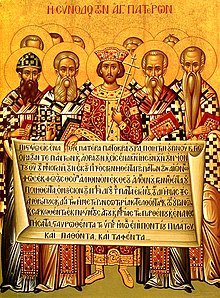
Back المجامع المسكونية السبعة Arabic المجامع المسكونيه السبعه ARZ প্রথম সাত সার্বজনীন পরিষদ Bengali/Bangla Primers set concilis ecumènics Catalan Primeros siete concilios ecuménicos Spanish هفت شورای جهانی اول Persian Tujuh konsili oikumenis pertama ID 全地公会議 Japanese Tujuh Majlis Ekumenikal pertama Malay L-ewwel seba' konċilji Ekumeniċi Maltese

In the history of Christianity, the first seven ecumenical councils include the following: the First Council of Nicaea in 325, the First Council of Constantinople in 381, the Council of Ephesus in 431, the Council of Chalcedon in 451, the Second Council of Constantinople in 553, the Third Council of Constantinople from 680 to 681 and finally, the Second Council of Nicaea in 787. All of the seven councils were convened in what is now the country of Turkey.
These seven events represented an attempt by Church leaders to reach an orthodox consensus, restore peace[1] and develop a unified Christendom.[2] Among Eastern Christians the Eastern Orthodox, Oriental Orthodox, and Church of the East (Assyrian) churches and among Western Christians the Roman Catholic, Anglican, Utrecht and Polish National Old Catholic, and some Scandinavian Lutheran churches all trace the legitimacy of their clergy by apostolic succession back to this period and beyond, to the earlier period referred to as the Early Church[broken anchor].
This era begins with the First Council of Nicaea in AD 325, convened by the emperor Constantine I following his victory over Licinius and consolidation of his reign over the Roman Empire. Nicaea I enunciated the Nicene Creed that in its original form and as modified by the First Council of Constantinople of 381 was seen by all later councils as the touchstone of orthodoxy on the doctrine of the Trinity.
The Eastern Orthodox and Roman Catholic Churches accept all seven of these councils as legitimate ecumenical councils. The Non-Chalcedonian Oriental Orthodox Churches accept only the first three, while the Non-Ephesian Church of the East accepts only the first two. There is also one additional council, the so-called Quinisext Council of Trullo held in AD 692 between the sixth and seventh ecumenical councils, which issued organizational, liturgical and canonical rules but did not discuss theology. Only within Eastern Orthodoxy is its authority commonly considered ecumenical; however, the Orthodox do not number it among the seven general councils, but rather count it as a continuation of the fifth and sixth. The Roman Catholic Church does not accept the Quinisext Council,[3][4] but both the Roman magisterium as well as a minority of Eastern Orthodox hierarchs and theological writers consider there to have been further ecumenical councils after the first seven (see the Fourth Council of Constantinople, Fifth Council of Constantinople, and fourteen additional post-schism ecumenical councils canonical for Catholics).
- ^ Slobodskoy, Serafim Alexivich (1992). "Short Summaries of the Ecumenical Councils". The Law of God. Translated by Price, Susan. Jordanville, New York: Holy Trinity Monastery. ISBN 978-0-88465-044-7. Archived from the original on 18 June 2018. Retrieved 10 March 2019 – via OrthodoxPhotos.com.
They renounced their false opinions and died in peace with the Church." (Russian: "отказались от своих ложных мнений и скончались в мире с Церковью.)
- Original: Слободской, Серафим Алексеевич (1957). "Краткие сведения о вселенских соборах" [Short Summaries of the Ecumenical Councils]. Закон Божий [The Law of God] (in Russian) (published 1966). Archived from the original on 25 July 2017. Retrieved 10 March 2019 – via Православная энциклопедия Азбукаверы | православный сайт [Orthodox Encyclopedia: ABC of faith | Orthodox website].
- ^
Diehl, Charles (1923). "1: Leo III and the Isaurian Dynasty (717–802)". In Tanner, J. R.; Previté-Orton, C. W.; Brooke, Z. N. (eds.). The Cambridge Medieval History. Vol. IV: The Eastern Roman Empire (717–1453). Cambridge: Cambridge University Press. p. 21. ISBN 9785872870395. Retrieved 2016-02-01.
... Tarasius ... skilfully put forward the project of an Ecumenical Council which should restore peace and unity to the Christian world. The Empress [...] summoned the prelates of Christendom to Constantinople for the spring of 786. ... Finally the Council was convoked at Nicaea in Bithynia; it was opened in the presence of the papal legates on 24 September 787. This was the seventh Ecumenical Council.
- ^ Schaff's Seven Ecumenical Councils: Introductory Note to Council of Trullo: "From the fact that the canons of the Council in Trullo are included in this volume of the Decrees and Canons of the Seven Ecumenical Councils it must not for an instant be supposed that it is intended thereby to affirm that these canons have any ecumenical authority, or that the council by which they were adopted can lay any claim to being ecumenical either in view of its constitution or of the subsequent treatment by the Church of its enactments."
- ^ "Quinisext Council". Encyclopædia Britannica. Retrieved February 14, 2010. "The Western Church and the Pope were not represented at the council. Justinian, however, wanted the Pope as well as the Eastern bishops to sign the canons. Pope Sergius I (687–701) refused to sign, and the canons were never fully accepted by the Western Church".